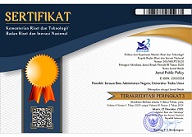Constraining Autonomy: How Bureaucratic Dysfunctions Impede Regional Financial Independence in a Decentralized Indonesia
Abstract
Keywords
Full Text:
PDFReferences
Almeida, F., & Wasim, J. (2023). Eco-innovation and sustainable business performance: Perspectives of SMEs in Portugal and the UK. Society and Business Review, 18(1), 123-145. https://doi.org/10.1108/SBR-12-2021-0233
Booth, D., & Golooba-Mutebi, F. (2012). Developmental patrimonialism? The case of Rwanda. African Affairs, 111(444), 379-403. https://doi.org/10.1093/afraf/ads026
Boston, J., Martin, J., Pallot, J., & Walsh, P. (1996). Public management: The New Zealand model. Oxford University Press.
Braun, D. (2000). The territorial division of power in comparative public policy research: An assessment. In D. Braun (Ed.), Public policy and federalism (pp. 27-56). Ashgate.
Caiden, G. E. (2019). Dealing with administrative corruption. In T. L. Cooper (Ed.), Handbook of administrative ethics (pp. 429-455). Routledge.
De Mello Jr, L. R. (2000). Fiscal decentralization and intergovernmental fiscal relations: A cross-country analysis. World Development, 28(2), 365-380. https://doi.org/10.1016/S0305-750X(99)00123-0
Frey, B. S., & Stutzer, A. (2000). Happiness, economy and institutions. The Economic Journal, 110(466), 918-938. https://doi.org/10.1111/1468-0297.00570
Glewwe, P., Huang, Q., & Park, A. (2016). Cognitive skills, non-cognitive skills, and school-to-work transitions in rural China. Journal of Economic Behavior & Organization, 134, 141-164. https://doi.org/10.1016/j.jebo.2016.12.009
Martias, E. (2018). Bureaucratic pathology in government administration: An analysis. Jurnal Teori Dan Riset Administrasi Publik, 1(2), 45-58. https://doi.org/10.24036/j-trap.v1i2.33
Maswati, R. (2023). Bureaucratic pathology in public services at the Office of the Department of Population and Civil Registration of Supiori District. Pasundan Social Science Development, 3(2), 112-127. https://doi.org/10.56457/pascidev.v3i2.58
Ministry of Finance, Republic of Indonesia. (2021). Regional financial statistics 2021. Directorate General of Fiscal Balance.
Mohi, W. K., Suprapto, S., & Yusuf, L. (2023). Bureaucratic Pathology In Sumalata District Office, North Gorontalo Regency. International Journal Papier Public Review, 4(1). https://doi.org/10.47667/ijppr.v4i1.184
Peltier-Rivest, D. (2018). A model for preventing corruption. Journal of Financial Crime, 25(2). https://doi.org/10.1108/JFC-11-2014-0048
Quah, J. S. (2003). Causes and consequences of corruption in Southeast Asia: A comparative analysis of Indonesia, the Philippines and Thailand. Asian Journal of Public Administration, 25(2), 235-266.
Rasyid, M. (2022). Analysis of the Implementation of Financial Accounting Standards Without Public Accountability (SAK ETAP) On the Presentation of Girirejo Village Unit’s Cooperative Financial Statements. MARGINAL: Journal of Management, Accounting, General Finance and International Economic Issues, 1(2), 11–18.
Ross, M. L. (2003). Nigeria’s oil sector and the poor. Position Paper for DFID-Nigeria, UCLA, Los Angeles.
Setyasih, E. T. (2023). Creating an Effective Bureaucracy by Reducing Bureaucratic Pathology in Local Governments. INFLUENCE: INTERNATIONAL JOURNAL OF SCIENCE REVIEW, 5(1). https://doi.org/10.54783/influencejournal.v5i1.112
Siagian, S. (2008). Manajemen Sumber Daya Manusia (cetakan 15). Jakarta: Bumi Aksara, 138.
Sitek, P. (2014). The Idea of the Local Government’s the Autonomy and Financial Independence. Annales Universitatis Apulensis Series Jurisprudentia, 17, 89.
Souza, C. (2002). Brazil: the prospects of a center-constraining federation in a fragmented polity. Publius: The Journal of Federalism, 32(2), 23-48.
Sugiyono, S. (2020). Quantitative Research Methods, Qualitative, and Mix method. Alphabet.
Verasvera, F. (2016). Pengaruh Anggaran Berbasis Kinerja Terhadap Kinerja Aparatur Pemerintah Daerah (Studi Kasus Pada Dinas Sosial Provinsi Jawa Barat). Jurnal Manajemen Maranatha, 15(2).
Zain, M. (2003). Manajemen Perpajakan Jakarta: Salemba Empat. Kinerja Atas Pelaksanaan Rencana Kerja Dan Anggaran.
DOI: https://doi.org/10.35308/jpp.v11i3.11776
Refbacks
- There are currently no refbacks.
Copyright (c) 2025 Kasmad Kamal, Dandi Darmadi, Iqbal Aidar Idrus
p-ISSN: 2477-5738 I e-ISSN: 2502-0528 I DOI: 10.35308
Jl. Alue Peunyareng, Ujong Tanoh Darat, Meureubo, Kabupaten Aceh Barat, Aceh 23681, Indonesia
(0655) 7110535 l +621260313742 l +6285277110911
 is licensed under a Creative Commons Attribution-ShareAlike 4.0 International License
is licensed under a Creative Commons Attribution-ShareAlike 4.0 International License


